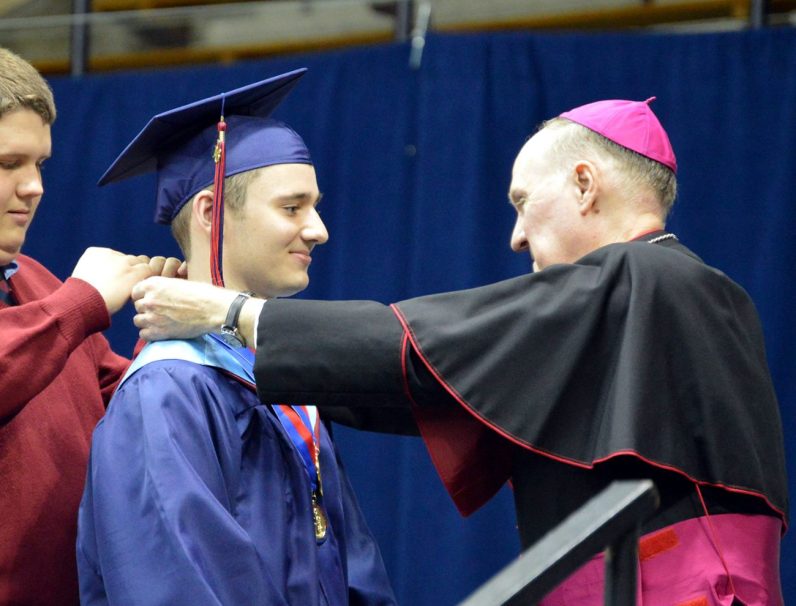
Bishop Michael Fitzgerald presents a medal to a student at Cardinal O’Hara High School’s graduation at Villanova University on Wednesday, June 8. (Courtesy photo)
Objectively we use hours, days, months and years to mark time. However, in our lived experience we rely on more relative terms. Our lives are defined by various key moments, and when telling stories and recalling memories, we use these pillars to frame our lives. One of these key transitions is graduation, whether it be from high school or college.
Transition from one phase of life to the next offers the opportunity for reflection. For Catholics, reflection takes on a deeper meaning when it includes our relationship with God. We call it an examination of conscience. Here’s an examination geared just for graduates:
— What have the highlights (and lowlights) been from my time throughout this phase of my education? How was God working in those moments? How was I able to grow from that experience?
As we get older it is always fun to engage in a little bit of nostalgia and look back upon the “good times” and “happy memories” from high school or college. To engage in an examination of conscience we must go deeper than smiling and laughing.
Even some of our experiences that initially seem far from our faith life can become opportunities to contemplate God’s presence in our everyday lives.
In examining the highlights, we must look for God’s presence in those moments. Then we can contemplate how it was that we were able to grow.
God isn’t only present in the highlights of high school and college; he’s also present in the low moments. When we sin, we turn our back on God, but he’s still there. He’s waiting for us to come back to him. God picks us back up again from our failures.
All of us, in one way or another, experience trials and mistakes. These failures provide an opportunity for growth. In preparing for graduation we have to take a hard look at our mistakes and sins, and how it is that God has helped us to grow out of them. To be cleansed of those sins, go to confession — graduation is the perfect time.
— Have I made time to say goodbye to my friends? Have I let go of any lingering grudges?
Don’t forget to say goodbye to your friends. Yes, you may have every intention of staying in touch in the years to come. However, even with the best of intentions, you will drift apart. Even if you do stay close, graduation still marks an undeniable change in your friendship. Be conscious about scheduling a time to say goodbye.
Some relationships ebb and flow. Events happen that drive a wedge between us. You don’t want to walk away from high school or college continuing to hold on to grudges.
If that’s the case you will carry an unnecessary burden and remain shackled. You don’t have to become best friends again, but an offer of forgiveness can allow you to graduate in peace.
— Have I said thanks to my family, mentors, friends and support system? God?
As you begin to gather for the graduation festivities, look around. Yes, some have gone through incredible trials and tribulations to reach this day. One thing we all have in common? No one can do it alone.
Whether it’s our parents, siblings, an aunt or an uncle, a grandparent, foster parent, a coach or a teacher, a priest, sister or youth minister, there’s someone who has helped you to make it this far. Thank them.
Beyond our human support system, there is a divine one: God. Maybe you’ve struggled seriously with doubts in the past couple of years. Maybe your faith is on fire right now. It’s not enough to acknowledge the ways that God has worked in our lives in these recent years, we also must offer thanksgiving.
In spite of the hectic nature of graduation, and even if it’s been a long time, make the effort to offer a holy hour of prayer in eucharistic adoration, thanking God for all the graces he has showered upon you.
— Have I truly entered into a process of discernment about my future? Am I open to God’s will in my life?
Discernment is a word unfortunately too often reserved for those contemplating the priesthood or consecrated life. Rather, discernment applies in a wide variety of contexts and can be most succinctly described as the practice of including God in our decision-making process.
So whether it’s choosing a university and major, or launching a career path, have you taken time to include God in that decision?
Instead of just doing whatever is easiest or the most comfortable for you, perhaps the criterion ought to be: What does God want from me? Am I choosing my future based off what letters will be after my name, how big my paycheck will be or what God is asking of me?
How can I better use the gifts and talents I’ve developed in these past years to better serve Christ and the church? If we seek a deep peace and lasting happiness, then those are the kinds of questions we need to be asking to authentically discern the next phase in life.
***
Father Brooke is a priest of the Diocese of Jefferson City, Missouri. His website is http://padregeoffrey.com and his social media handle is @PadreGeoffrey.
PREVIOUS: Recent graduates describe service in ‘gap years’
NEXT: Graduation: A time for discernment before stepping forward


Share this story